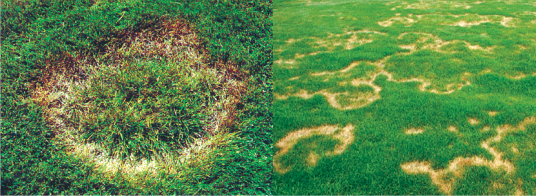Excessive Rain Spells Fungus Problem for Lawns
While the rain this spring may have your grass screaming green, too much rain can cause big problems for your lawn.
Necrotic ring spot (NRS), also known as “frog eye,” is caused by over watering and/or over fertilizing. Symptoms typically arrive in late July and August, but due to the high amount of rain we’ve received this spring, NRS is actively attacking lawns now along the Colorado Front Range from Fort Collins to Castle Rock.
At first, lighter green or straw-colored rings begin to appear. Grass inside the ring remains green and healthy, but the rings themselves become matted as the grass dies. If left untreated, NRS can cause a LOT of damage, but with proper treatment of fungicide treatments coupled with good lawn management practices, NRS can be suppressed and your lawn will thrive.

Photo courtesy of Swingle Lawn, Tree & Landscape Care
What you can do:
- There’s no need for watering with sprinklers when it’s this wet.
- How to know when to water: step on the grass and if the blades pop back up, hold off on watering; if you can see your footprint, then your lawn is thirsty and in need of a satisfying drink.
- Leave grass clippings on your lawn after mowing — the clippings contain beneficial nutrients needed by your lawn.
- Poke holes in your lawn to get oxygen to the roots — aeration can be very useful for this.
- Take action now: get a lawn care program specifically designed to suppress NRS.
- It can take up to 2 years for treatments to suppress the disease, so if your lawn shows symptoms of NRS, don’t delay in contacting a professional.
Due to the unusual weather this spring, we expect to see widespread lawn diseases that we haven’t seen in a long time. With the unique climate we have here in Colorado, lawn care in Denver, Fort Collins, and surrounding areas can be challenging at times, but Swingle’s experts are always just a phone call away.
Courtesy of Swingle Lawn, Tree & Landscape Care at http://myswingle.com/blog/excessive-rain-spells-fungus-problem-for-lawns/






